|
|
|
Sort Order |
|
|
|
Items / Page
|
|
|
|
|
|
|
| Srl | Item |
| 1 |
ID:
111690
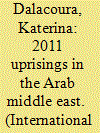

|
|
|
|
|
| Publication |
2012.
|
| Summary/Abstract |
The Arab uprisings of 2011 are still unfolding, but we can already discern patterns of their effects on the Middle East region. This article offers a brief chronology of events, highlighting their inter-connections but also their very diverse origins, trajectories and outcomes. It discusses the economic and political grievances at the root of the uprisings and assesses the degree to which widespread popular mobilization can be attributed to pre-existing political, labour and civil society activism, and social media. It argues that the uprisings' success in overthrowing incumbent regimes depended on the latter's responses and relationships with the army and security services. The rebellions' inclusiveness or lack thereof was also a crucial factor. The article discusses the prospects of democracy in the Arab world following the 2011 events and finds that they are very mixed: while Tunisia, at one end, is on track to achieve positive political reform, Syria, Yemen and Libya are experiencing profound internal division and conflict. In Bahrain the uprising was repressed. In Egypt, which epitomizes many regional trends, change will be limited but, for that reason, possibly more long-lasting. Islamist movements did not lead the uprisings but will benefit from them politically even though, in the long run, political participation may lead to their decline. Finally, the article sketches the varied and ongoing geopolitical implications of the uprisings for Turkish, Iranian and Israeli interests and policies. It assesses Barack Obama's response to the 2011 events and suggests that, despite their profound significance for the politics of the region, they may not alter the main contours of US foreign policy in the Middle East in a major way.
|
|
|
|
|
|
|
|
|
|
|
|
|
|
|
|
| 2 |
ID:
111694
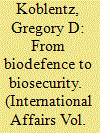

|
|
|
|
|
| Publication |
2012.
|
| Summary/Abstract |
The Seventh Review Conference of the Biological Weapons Convention (BWC), the first international treaty to outlaw an entire class of weapons, was held in Geneva in December 2011. On 7 December, Secretary of State Hillary Clinton became the highest-ranking US government official to address a BWC meeting. Secretary Clinton told the assembled delegation that 'we view the risk of bioweapons attack as both a serious national security challenge and a foreign policy priority'. At the same time, she warned that a large-scale disease outbreak 'could cripple an already fragile global economy'. Secretary Clinton's speech reflected a new understanding that the range of biological threats to international security has expanded from state-sponsored biological warfare programmes to include biological terrorism, dual-use research and naturally occurring infectious diseases such as pandemics. Recognizing these changes, President Barack Obama released a new national strategy for countering biological threats in 2009. This strategy represents a shift in thinking away from the George W. Bush administration's focus on biodefence, which emphasized preparing for and responding to biological weapon attacks, to the concept of biosecurity, which includes measures to prevent, prepare for and respond to naturally occurring and man-made biological threats. The Obama administration's biosecurity strategy seeks to reduce the global risk of naturally occurring and deliberate disease outbreaks through prevention, international cooperation, and maximizing synergies between health and security. The biosecurity strategy is closely aligned with the Obama administration's broader approach to foreign policy, which emphasizes the pragmatic use of smart power, multilateralism and engagement to further the national interest. This article describes the Obama administration's biosecurity strategy; highlights elements of continuity and change from the policies of the Bush administration; discusses how it fits into Obama's broader foreign policy agenda; and analyses critical issues that will have to be addressed in order to implement the strategy successfully.
|
|
|
|
|
|
|
|
|
|
|
|
|
|
|
|
| 3 |
ID:
111693
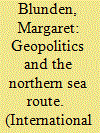

|
|
|
|
|
| Publication |
2012.
|
| Summary/Abstract |
Experimental transit voyages along the Northern Sea Route to the north of Russia are breaking new ground each year and the route is already significant for the export of raw materials from Russian ports. National and corporate interests are now driving Russia's Arctic policy, rather than, as formerly, an exclusive focus on security, and the Russian government has ambitious plans for the development of the route. Future regular transit of the Northern Sea Route between Europe and Asia, at present facing serious obstacles, could be accelerated not only by climate change, but by overload on, or interruptions to, the existing route through the Suez Canal, which passes through some of the world's most volatile regions. Despite the formidable impediments to regular year round transit of the Northern Sea Route, governments of the non-Arctic states with most at stake, particularly Germany and China, appear to be taking no chances, and to be jockeying for influence in the Arctic region. The interests of the non-Arctic trading states, and of the European Union, more inclined to view the Arctic Ocean as part of the 'common heritage of mankind', are however potentially different from those of Russia, and indeed of Canada in respect of the North East passage, both determined to maintain their exclusive national jurisdiction over emerging sea lanes through their territorial waters. Great issues are at stake here. The emergence of new sea lanes has historically impacted heavily on the international balance of power. Where the merchant fleets go, navies will shortly follow.
|
|
|
|
|
|
|
|
|
|
|
|
|
|
|
|
| 4 |
ID:
111691


|
|
|
|
|
| Publication |
2012.
|
| Summary/Abstract |
The argument advanced in this article is that EU policies helped to trigger the so-called Arab Spring, not by intention but by default. This contention is advanced through an examination of four strands of EU policy towards those countries designated as Mediterranean Partner Countries (MPCs) under the Euro-Mediterranean Partnership Programme (EMP) and the European Neighbourhood Policy (ENP), namely: trade and economic development, political reform, the 'peace process', and regional security (including migration control). What emerges is that the EU has not just departed from its own normative principles and aspirations for Arab reform in some instances, but that the EU has consistently prioritized European security interests over 'shared prosperity' and democracy promotion in the Mediterranean. The net result is a set of structured, institutionalized and securitized relationships which will be difficult to reconfigure and will not help Arab reformers attain their goals.
|
|
|
|
|
|
|
|
|
|
|
|
|
|
|
|
| 5 |
ID:
111688


|
|
|
|
|
| Publication |
2012.
|
| Summary/Abstract |
Since the disintegration of the Soviet Union the role of Russia in international relations has been in flux-a reflection of its changing capacities, positions and interests. To a certain extent, this variability has been defined by the Russian economy, which in the 1990s passed through a stage of deep structural transformation and severe financial crisis, but which then benefited from a period of fast and mainly stable economic growth in the first years of the twenty-first century. Now, the serious economic decline as a result of the global crisis of 2008-2009 has been replaced by an unstable and uncertain recovery.
In the 2000s a very specific political regime of personalized power under Vladimir Putin-set to be back as president in 2012-was established in Russia. During his next term Putin will face the most serious challenges to Russia's economic policy yet. According to some scenarios, these challenges could significantly destabilize the country's politics and economy. Russia is facing a demographic trap; the ageing of the population is increasing the pension burden on the budget, while the shrinking labour force will surely become an obstacle to growth. The dependence of the budget and balance of payments on the price of oil has grown so great that even price stabilization becomes a threat to macroeconomic stability. The poor quality of the investment climate leads to falling private investment which, in turn, hinders the much-vaunted modernization of the economy. If combined, these problems will lead to the widening of the gap in technology and living standards between Russia and developed countries.
Elimination of political competition and the impossibility of replacing political leaders through elections have led to widespread corruption and abuses, crony capitalism, and the complete undermining of the independence of the courts and law enforcement which further complicates the search for adequate responses to the mounting economic challenges. As there are no reasons to believe that Vladimir Putin is going to reform the country's current political system, the gradual accumulation of economic problems could well become the main threat to his presidency as Russia heads towards 2020.
|
|
|
|
|
|
|
|
|
|
|
|
|
|
|
|
| 6 |
ID:
111687


|
|
|
|
|
| Publication |
2012.
|
| Summary/Abstract |
This article argues that Dmitry Medvedev's term in office, despite the continuity in Russia's foreign policy objectives, brought about a certain change in Russia's relations with the European Union and the countries of the Common Neighbourhood. The western perceptions of Russia as a resurgent power able to use energy as leverage vis-à-vis the EU were challenged by the global economic crisis, the emergence of a buyer's market in Europe's gas trade, Russia's inability to start internal reforms, and the growing gap in the development of Russia on the one hand and China on the other. As a result, the balance of self-confidence shifted in the still essentially stagnant EU-Russian relationship. As before, Moscow is ready to use all available opportunities to tighten its grip on the post-Soviet space, but it is less keen to go into an open conflict when important interests of EU member states may be affected. The realization is slowly emerging also inside Russia that it is less able either to intimidate or attract European actors, even though it can still appeal to their so-called 'pragmatic interests', both transparent and non-transparent. At the same time, whereas the new modus operandi may be suboptimal from the point of view of those in the country who would want Russia's policy to be aimed at the restoration of global power status, it is the one that the Kremlin can live with-also after the expected return of Vladimir Putin as Russia's president. Under the current scheme, the West-and the EU in particular-does little to challenge Russia's internal order and leaves it enough space to conduct its chosen course in the former Soviet Union.
|
|
|
|
|
|
|
|
|
|
|
|
|
|
|
|
| 7 |
ID:
111692
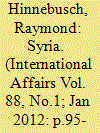

|
|
|
|
|
| Publication |
2012.
|
| Summary/Abstract |
Syria was, until recently, seen as a 'successful' example of authoritarian 'upgrading' or 'modernization;' yet in 2011 the Syrian regime faced revolution from below: what went wrong? Bashar al-Asad inherited a flawed regime yet managed to start the integration of his country into the world capitalist market, without forfeiting the nationalist card by, for instance, attempting to acquire legitimacy from opposition to Israel and the US invasion of Iraq. Yet, despite his expectations and that of most analysts, his regime proved susceptible to the Arab uprising. This article examines the causes and development of the Syrian uprising of 2011. It contextualizes the revolt by showing how the construction of the regime built in vulnerabilities requiring constant 'upgradings' that produced a more durable regime but had long term costs. It focuses on Bashar al-Asad's struggles to 'modernize' authoritarianism by consolidating his own 'reformist' faction, balancing between the regime's nationalist legitimacy and its need for incorporation into the world economy; his shifting of the regime's social base to a new class of crony capitalists; and his effort to manage participatory pressures through limited liberalization and 'divide and rule'. The seeds of the uprising are located in these changes, notably the abandonment of the regime's rural constituency and debilitating of its institutions. Yet, it was Asad's inadequate response to legitimate grievances and excessive repression that turned demands for reform into attempted revolution. The article then analyses the uprising, looking at the contrary social bases and strategies of regime and opposition, and the dynamics by which violence and foreign intervention have escalated, before finishing with comments on the likely prognosis.
|
|
|
|
|
|
|
|
|
|
|
|
|
|
|
|
| 8 |
ID:
111689
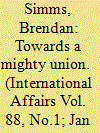

|
|
|
|
|
| Publication |
2012.
|
| Summary/Abstract |
A strong European Union is needed today more than ever: to act as a reliable partner to the United States, Great Britain and the other great democracies; to deal with the growing threats on her southern and eastern periphery; and most pressingly of all, to deal with the euro sovereign debt crisis. In order to do so, Europeans will have to abandon the gradualist fallacy that union will be achieved in small incremental steps and learn the lesson of history that all successful mergers, such as the British and the American, have been carried out in one fell swoop at a time of extreme crisis. They will have to recognize that the road to unity took a fatal turn when the failure of the European Defence Community caused a bifurcation between politico-military and economic integration. Today, as we face potential fiscal and economic meltdown and as the external threats to Europe mount, we have another opportunity. We can only seize it, however, if we realize that full European union, if there is to be one, will be an event, not a process. It must follow more or less the American example with a directly elected presidency, a house of representatives elected by population and a senate, which represents the former nation-states and regions. There is no need for the United Kingdom to be part of this project, but it is essential that both unions work together for the common good. Because the existing political elites are incapable of rising to the occasion-and in many cases are actually antipathetic to it-the task must fall to a new pan-European party: the Party of Democratic Union.
|
|
|
|
|
|
|
|
|
|
|
|
|
|
|
|
| 9 |
ID:
111686


|
|
|
|
|
| Publication |
2012.
|
| Summary/Abstract |
Power and authority in Russia are traditionally seen to reside with the president. Such an understanding was emphasized during the eight years of Vladimir Putin's presidency, from 2000 to 2008, as he sought to centralize power, strengthen the state and establish a strong vertical of power to implement policy. This article examines the nature of this power and authority in the light of the tandem, the ruling arrangement between current President Dmitry Medvedev and Prime Minister Putin. While acknowledging the central importance of Vladimir Putin in Russian political life, the article argues that emphasis on his role draws too much attention away from the leadership team that he has shaped with Medvedev. This team takes shape in formal institutional structures such as the Security Council, which has become an increasingly important group as a reservoir of experience and authority. It also takes shape in an informal network that stretches across state and business boundaries. Although there are some tensions in the network, this team ensures broad policy continuity. Furthermore, the article questions Putin's success in establishing a vertical of power, and the authority of both President Medvedev and Prime Minister Putin. The analysis explores evidence that suggests that, despite the appointment of loyal personnel in this vertical of power, presidential instructions, orders and personnel commands often remain incompletely and tardily carried out or even unfulfilled. In essence, therefore, although many have suggested a split within the leadership, particularly between Medvedev and Putin, the article suggests that the more important splits are horizontal ones between different layers of authority. Thus, a process of direct control is necessary, whereby the most senior officials are obliged personally to oversee the implementation of their instructions. The article concludes by suggesting a reconsideration of our terms of reference for Russian politics, replacing the tandem with the team, and introducing 'manual control'.
|
|
|
|
|
|
|
|
|
|
|
|
|
|
|
|
|
|
|
|
|